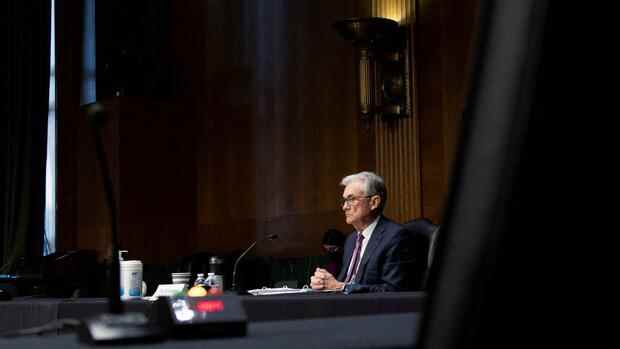New York, Frankfurt The stock markets are in fear mode: On Wall Street, the market-wide leading index S&P 500 has lost more than seven percent since the beginning of the year, the technology index Nasdaq Composite has lost more than ten percent in the same period. January is traditionally seen as a strong month, with fresh money flowing into the markets.
Europe has also caught up with the uncertainty. The Eurostoxx 600 lost almost five percent in value in January, as did the leading German index, the Dax.
This week’s US Federal Reserve meeting has the potential to exacerbate this development: the results will be announced on Wednesday evening European time. Many market participants fear that the monetary watchdogs will tighten their course even more than previously expected. Should that not happen, the markets should react with relief. Additional measures, on the other hand, could cause turbulence.
The forecast by JP Morgan economist Michael Feroli can serve as an example of average expectations. He addresses two important issues: interest rates and total assets.
Top jobs of the day
Find the best jobs now and
be notified by email.
Feroli expects the Fed to make a relatively clear prospect of a first interest rate hike as early as March – and justifies this with the fact that there is almost full employment. However, he does not believe that the first rate hike will equal half a percentage point. This demand was made by hedge fund manager Bill Ackman, among others.
Feroli also considers a surprise rate hike as early as this week to be unlikely. On Wednesday, investors will also pay attention to possible indications of how many interest rate hikes are still to be expected in the current year.
The estimates, for example from Goldman Sachs, have so far mostly amounted to up to four increases of a quarter percentage point each. The key interest rate is currently between 0.0 and 0.25 percent
Heated discussions among economists
In Feroli’s view, Fed Chair Jerome Powell will stick with gradually reducing net bond purchases to net zero by March. With a probability of 25 percent, however, the Fed could also stop these purchases immediately, he writes. It is not yet entirely clear when she will start reducing the balance sheet total. Goldman Sachs expects an announcement in July.
In the past few days, the discussion among economists has also become heated, as can be seen above all on Twitter. Robin Brooks, chief economist at the major banking organization IIF in Washington, wondered why the Fed is talking so much about raising interest rates instead of “talking up” the yields on ten-year US government bonds. It’s “quicker and more effective”.
Diane Swonk, chief economist at the consulting firm Grant Thornton, registers an “amazing 180-degree turn from patience to panic” at the Fed. US economist Mohamed El-Erian, who advises Allianz, among others, demands that Powell explain why he underestimated inflation for so long.
In addition, he should “immediately” stop the net purchase of bonds and, from March, begin not to replace expiring interest-bearing securities. That would lead to a shrinking of the balance sheet total and thus drive up bond yields.
So far, the Fed has announced that it will gradually reduce net purchases to zero by March. At the same time, the minutes of the December meeting revealed that there was a serious internal discussion about allowing the balance sheet total to shrink afterwards. So at the same time, the Fed continued to increase the balance sheet total and was already discussing the reduction – which caused some astonishment.
Krugman: “I was wrong”
A virtual discussion between US economists Larry Summers and Paul Krugman was also revealing. Krugman admitted: “I was wrong.” He had underestimated the dynamics of inflation, while Summers, El-Erian and also Olivier Blanchard, the former chief economist at the International Monetary Fund (IMF), warned against it.
Krugman said he underestimated how tight the US job market was. The unemployment rate in 2021 was a good five percent. But workers’ willingness to change jobs is closer to an unemployment rate of just 2 percent compared to previous data, Krugman said. It is possible that there are still people reported in the statistics who are no longer really available for the labor market.
Summers added that this willingness to switch is a very good indicator of inflation, so he doesn’t expect price increases to slow down for the time being. He recommends that the Fed raise interest rates very significantly.
He also made it clear that he doesn’t believe in monetary policymakers relying on long-term forecasts or committing themselves to long-term perspectives. Rather, they should issue clear, simple messages and otherwise follow the current data. Summers was a former US Treasury Secretary but was defeated by Powell’s predecessor, Janet Yellen, to run for the Fed chair.
More: What the turning point in interest rates means
